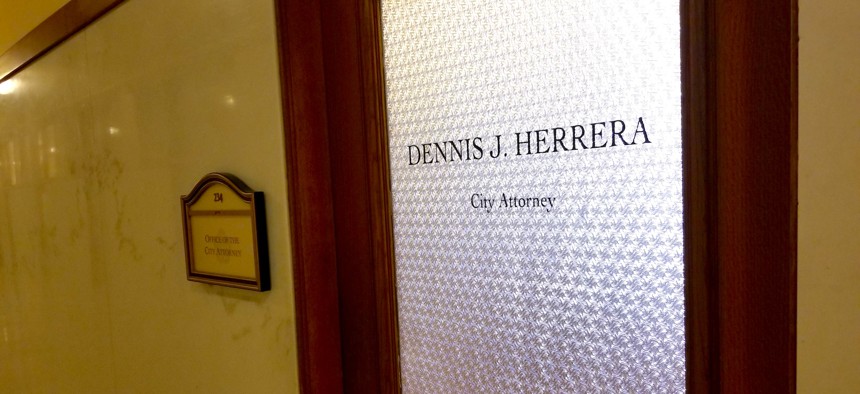San Francisco City Attorney’s Subpoenas Put New Pressure on Uber, Lyft

The office of San Francisco City Attorney Dennis Herrera in San Francisco City Hall. Michael Grass / Route Fifty
Any lawsuit that may come could set a precedent across all of California.
SAN FRANCISCO — Uber and Lyft are facing new legal scrutiny in the city where app-based ride-hailing services first took root and flourished.
On Tuesday, San Francisco City Attorney Dennis Herrera announced new subpoenas his office sent Uber and Lyft that seek information about how much those driving for the transportation network companies in the city are making and whether those TNCs are in compliance with local ordinances.
According to an announcement from Herrera’s office:
In light of the California Supreme Court’s decision that companies must affirmatively prove a worker is an “independent contractor” before denying that person the wages and benefits guaranteed to California employees, Herrera seeks proof that Uber and Lyft have lawfully classified drivers as independent contractors or provide their drivers with minimum wage, sick leave, health care contributions, and paid parental leave.
“San Francisco’s laws help ensure that employers provide a fair day’s wage for a fair day’s work,” Herrera said in Tuesday’s announcement. “Our laws also guarantee employees basic humane benefits like sick leave, health care, and paid parental leave. We are not going to turn a blind eye if companies in San Francisco deny workers their pay and benefits. We are not going to tolerate any company shirking its responsibility to pay for benefits and shifting that burden onto taxpayers when drivers without health insurance turn to the emergency room. If your company is valued at $62 billion, you can afford to give your workers health care.”
As the San Francisco Chronicle reported Tuesday:
While Herrera has not said what he’ll do once he gets the data, lawyers said the subpoena is likely a prelude to prosecuting Uber and Lyft over driver status.
“Reading the tea leaves, I assume he’s headed down that path,” said Aaron Kaufmann, a partner at labor-law firm Leonard Carder in Oakland. “If so, it could be very significant because he has the ability to get systemic relief, at least for drivers in San Francisco.”
Others said that any lawsuit would likely end up affecting all drivers in California.
Uber didn’t respond to a request for comment from the Chronicle but a Lyft spokesman said that the company looks forward to “helping the City Attorney’s office fully understand Lyft’s business model, including our relationship with drivers.”
Specifically, the subpoenas seek a “complete list of drivers who began or ended at least one ride in San Francisco from 2015 to the present,” according to Herrera’s office, plus “documentation showing whether the company classifies those drivers as an employee or an independent contractor for purposes of San Francisco and/or California law,” “documentation on hours, wages, health care payments and other benefits for drivers classified as employees,” and “proof that any driver classified as an independent contractor meets all three criteria set by the California Supreme Court.”
In addition to Uber and Lyft, Herrera’s office sent a subpoena to Rasier, a wholly owned subsidiary of Uber Technologies.
Michael Grass is Executive Editor of Government Executive’s Route Fifty and is based in Seattle.
NEXT STORY: The U.S. Might Need Self-Driving Trucks to Avoid a Labor Shortage Crisis






